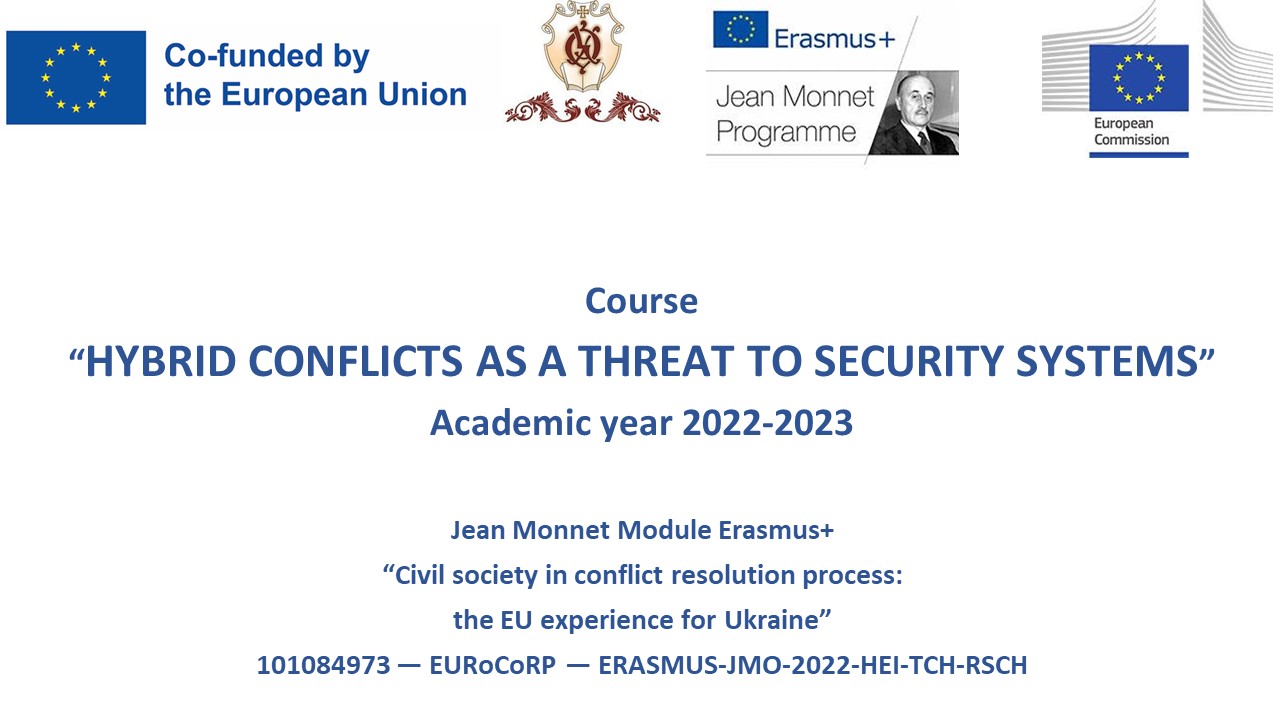From May 1 to June 19, students of Ostroh Academy took part in the certificate program “Hybrid Conflicts as a Threat to Security Systems”, which is being implemented as part of the Jean Monnet project “Civil Society in Conflict Resolution Process: EU Experience for Ukraine”.
Among the speakers of the course:
- Olena Shershnova, project coordinator, PhD in Public Administration, Senior Lecturer at the Department of Journalism and PR Management of NUOA;
- Dmytro Shevchuk, Doctor of Philosophy, Professor, Vice-Rector for Scientific and Pedagogical Work of NUOA;
- Serhii Ishchuk, Doctor of Law, Associate Professor, Director of the Malynovskyi Institute of Law of NUOA;
- Tetyana Sydoruk, Doctor of Political Science, Professor, Head of the Department of International Relations of NUOA;
- Kateryna Yakunina, PhD in History, Senior Lecturer at the Department of Philosophy and Cultural Management of NUOA.
During the course, participants had the opportunity to attend 20 lectures and participate in 10 workshops. The topics discussed included modern research on hybrid conflicts; EU security policy and legal framework; the activities of the European Center of Excellence for Countering Hybrid Threats; cycles of hybrid political conflict; hybrid peace as a category in conflict studies, etc.
“Today, the world has entered a dangerous new era, which includes the confrontation of great powers, the return of war to Europe, terrorist attacks and cyber attacks that are rapidly changing their forms. Russia’s invasion of Ukraine has changed the way many people view the world and the main threats to international peace and security. One of the most frightening things that the Russian war in Ukraine has demonstrated is how fragile peace is, how easy it is for people to disrupt it, and how quickly we can find ourselves in the middle of a real catastrophe. So, despite all the work of international theorists, we really have little understanding of how our world works,” – emphasized Tetyana Sydoruk.
Ms. Tetyana added that this is why the course “Hybrid Conflicts as a Threat to Security Systems” is so important, as it is aimed at teaching students the legal, political, international, security and social aspects of hybrid conflicts and other newest threats to national and international security.
“The course “Hybrid Conflicts as a Threat to Security Systems” allows students to understand the essence of the phenomenon of hybridity, asymmetry, and their role in modern political conflicts. Studying the EU and global legal framework for preventing, securing and/or combating hybrid threats allows you to be more aware of the course of hybrid conflicts today. Such theoretical training will allow students to navigate in the near professional future, when Ukraine will become a field for researching the consequences of hybrid warfare,” – said Kateryna Yakunina.
Victoria Vitsenko, a 2nd year student majoring in International Relations, Public Communications and Regional Studies, shared her impressions of the course:
“In general, I really like this course because it is not only interesting but also useful for expanding my knowledge of countering hybrid threats. It is important to me primarily because of my special interest in studying European Union policy. I would also like to note the high quality and interest of the material presented by all the lecturers of this course.”
Tetiana Dudok, a 2nd year student majoring in National Security, noted that the course “Hybrid Conflicts as a Threat to Security Systems” was a valuable and informative resource:
“The course not only provided me with the knowledge and skills to better understand and analyze hybrid conflicts, but also showed me how to solve them through the involvement of civil society and how to use the experience of the European Union. The course covered the political, military, economic, information and cyber aspects of hybrid conflicts, which allowed for a comprehensive understanding of the problem. Lectures and practical classes complemented each other. The lecturers provided practical examples and used samples from the experience of the European Union. I understood the specific steps and strategies that can be applied to counter hybrid threats and improve security in Ukraine.”
It is worth reminding that the project “Civil Society in Conflict Resolution Process: EU Experience for Ukraine” (101084973 – EURoCoRP – ERASMUS-JMO-2022-HEI-TCH-RSCH) is implemented by the National University of Ostroh Academy with co-financing from the European Union and aims to promote the values of EU civil society in conflict resolution and raise awareness of modern hybrid conflicts.
Author:
Solomiya Kostenkova
Source:

